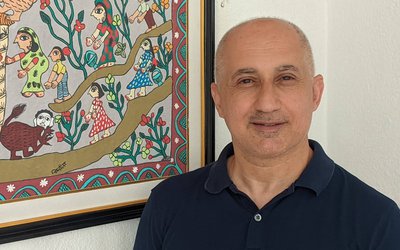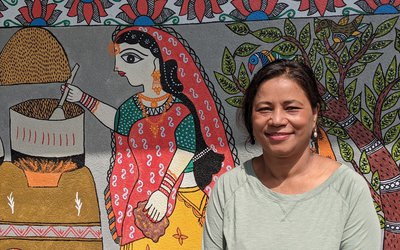CHIJ KUMAR SHRESTHA, Country Director, World Education Inc, is a known figure in Nepal’s civil society movement. Former chairperson of the Association of International Non-governmental Organizations, Shrestha spoke to New Spotlight on various issues, particularly the role played by Nepal’s civil society organizations, like World Education, in the process of development and social transformation. Excerpts:
What is the main area of work for the World Education Inc?
We strongly believe that education is the key to help people access new information which leads them to the realm of knowledge about their rights and their situation and empowers them to take necessary steps to address them. This is the reason we have been saying that education is the key to any development. It is more important in a country like ours where the education system is still poor. Although we have been talking about free and compulsory education, the country is yet to provide both. Of course, enrollment in schools in general is increasing but there are still quite a lot of children who are outside the schools. Besides, a lot of adult women, who have the responsibility of bringing up their children, are themselves not literate. All of them have effects in our development efforts. Lack of education is behind our slow progress in development activities. Education, both formal and non-formal, needs a boost. Formal way of education will help raise the rate of literacy because a large number of students are going to formal schools. But, those children and adults who are left out from the main stream of education have to go through non-formal channels.
How are you working?
World Education Inc has been working in partnership with local NGOs and in collaboration with Department of Education and UNICEF in various districts of Nepal. Our partners and our staff have worked together at local, regional and national levels to improve the lives of poor and marginalized groups through educational health and economic interventions. One of our key programs is directed to combating child labor through educational interventions.
How do you take the Naya Bato and Naya Paila Project (2009-2012)?
This is one of the ongoing efforts to combat child labor through ( New Path, New Steps) educational interventions. We have reached out to child beneficiaries in six worst forms of child labor sectors including brick making, portering, mining, jari industry, domestic labor and commercial sexual exploitation of children. Supported by United States Department of Labor, this program has brought a tangible change in the life of several thousand child laborers. It also has generated awareness among the people regarding the child labor situation and related government laws in the country.
What are the other benefits of the program?
We have launched various activities to improve income generation opportunities for over 13,00 families of beneficiary children. We have already launched the programs to make learning more practical or oriented towards the life sills. Working with different stakeholders, we have also developed pre-vocational curriculum package for public schools and are working with implementing partners in vocational training as well as vocational apprenticeships.
What other programs have you done so far?
In collaboration with the Department of Education and UNICEF, we are providing technical assistance to improve management and planning for education and improve the Education Management Information System and in developing resource materials to make schools more child friendly. Same way, technical assistance is provided to the Children in Armed Forces and Armed Groups (CAFAAG) and Schools as Zone of Peace projects. These programs have brought many successful examples in reintegration attempts for the children as well as successful promotion of the code of conduct for school authorities. In the year 2010, we reached out to 958 CAFAAG beneficiaries and under SZOP, reached out to 550 schools and 232,945 children in 9 districts.
At a time when there are huge gaps in the resource allocation in education, health and many other social sectors, what is the role of the international civil society organizations like yours to play? How can INGOs supplement and compliment the resource gap in the government programs?
International NGOs can do two things. First, provide additional resources and second, bring quality. For example in the education sector, the present state of resources is not adequate to meet the needs. Even the available resources from government and donor funding are yet to reach in the areas where they are required. There is no equity in resource distribution. There is no flexibility in testing out innovative approaches. National and international organizations like World Education Inc can play important roles in these areas.
As the government of Nepal has been launching activities against child labor, what difference does the program launched by World Education Inc make?
First of all when we launched the child labor project, our concentration was on the theme of education for all. As long as we cannot get the school age children enrolled in school, we cannot claim that we provided the education for all. If we take the example of disabled children, only a tiny portion of the disabled children are in school. Number of child laborers is very big. One of the aims of our project is to send these children to schools and to provide them education. After inception of the project, we have encountered a number of things which we had not imagined before its inception. Over 50 percent of children are forced by their parents to go for child labor. Most employers are not aware of the state's laws regarding child labor. The enforcement part of the law is very poor. The children are not aware of their even basic rights to education, health etc. Hence our focus now is to launch awareness campaigns in working together with our NGO partners, help children understand their rights, work with the government stakeholders in addressing these issues and also with the family members in helping them to withdraw their children from the worst forms of child labor and sending them to school or other forms of education.
Why is education important to eliminate poverty?
Poverty and lack of awareness are the main reasons behind child labor. Once the children are trapped in the labor market, the children are not only deprived of basic education, they become victims of sexual and other forms of exploitations such as very long hours of work in an en environment which is hazardous for their health , poor living and eating conditions, not being able to be with other children, not getting paid, not getting proper care when they are sick etc. We have started additional program to generate awareness about the child rights among those who hire children for work, child laws and their responsibilities. A good number of employers have started to send the children in school for formal or non-formal education classes. There have been considerable changes in the living conditions of the children. We have also provided the Ministry of Labor and Transport in developing a Master plan on Child Labor.
Along with working as country director of World Education Inc, you also held the chairmanship of AIN. Although INGOs have made enormous contribution in Nepal’s development and social transformation process, how do you see the negative perception of people regarding the role of civil society organizations like INGOs?
Although this situation is changing more positively in the recent years, I feel that there is some misunderstanding and misinterpretation regarding the role of INGOs in Nepal. We need to understand that an INGO can work in Nepal if a) the government allows them to work here. This is done through a general agreement with the Social Welfare Council b) if the INGO is able to mobilize resources for the activities they agree to carry out under the general agreement followed by a project agreement. And c) if the organization has technical capacity to implement the project. It part, perhaps it is our weakness too that we have not been able to disseminate information on our work – its aims and objectives properly to the different stakeholders in the community. AIN has been more active in addressing these issues recently by a) developing partnership guidelines for working in Nepal and b) adopting a code of conduct. These documents specifically mention the core guiding principles related to topics like accountability, transparency, coordination, commitment to equity and diversity etc. Anybody can access to these documents from the AIN Secretariat.
As INGOs have been contributing over 12 billion dollars in Nepal’s various development programs, why do people not recognize it?
People need to understand that If INGOs don't bring such resources, the resource gap will be larger. Moreover, the gap will be in such a sector where government's program has minimum effect. We are committed to equity and diversity of people whether it be in our own organizations or among those we work with or the beneficiaries of our projects in terms of caste, gender, ethnicity and religion. Our effort is reaching the un-reached, unrepresented or marginalized groups. We are happy to note that the government institutions like National Planning Commission, Ministry of Finance, Ministry of Health, Ministry of Education and other number of line ministries are recognizing the role of INGOs by seeking AIN's input in various policy related matters.
- TANAHU HYDROPOWER PROEJCT: A Significant Achievement
- Apr 15, 2024
- AMBASSADOR HANAN GODAR: Sharing Pain With A Nepali Family
- Mar 30, 2024
- VISIT OF KfW AND EIB TO NEPAL : Mission Matters
- Mar 25, 2024
- NEPAL BRITAIN SOCIETY: Pratima Pande's Leadership
- Mar 24, 2024
- NEPAL ARMY DAY: Time To Recall Glory
- Mar 15, 2024
















